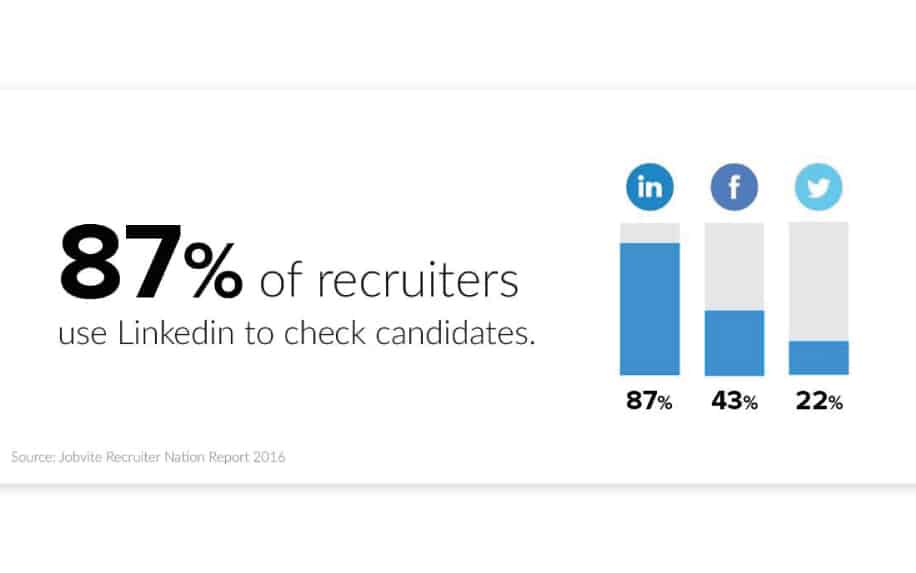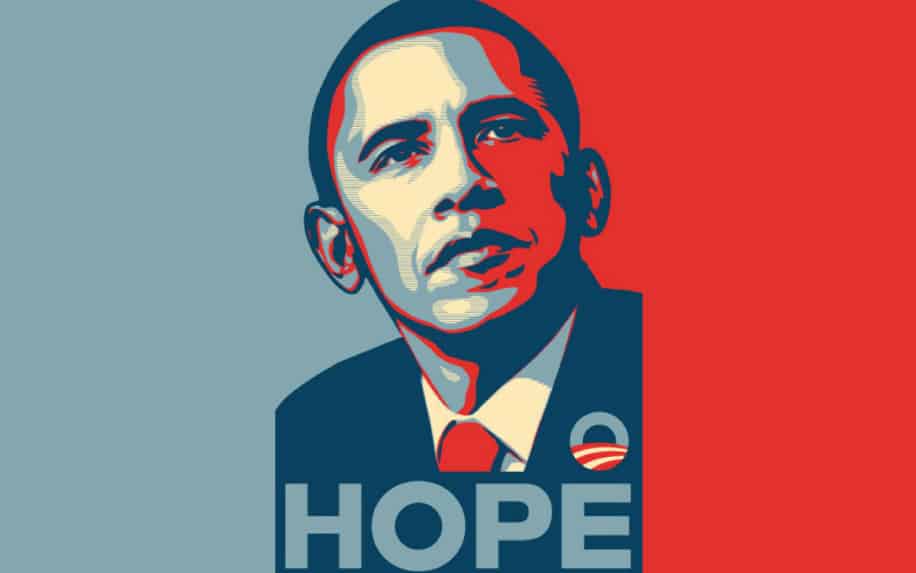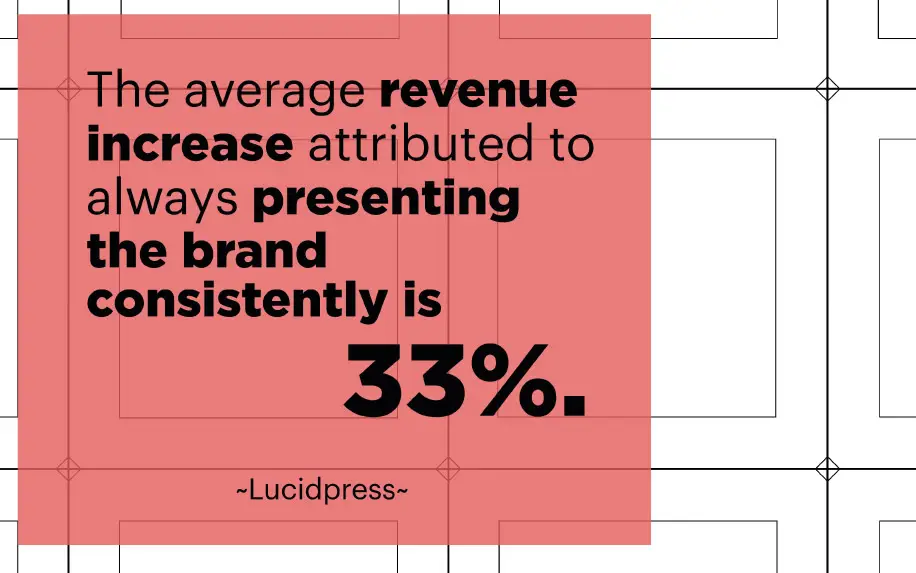Why is personal branding important? To many people, this is simply egotism. After all, personal branding is one thing for the Kardashians, but isn’t this a bit pretentious for the average person on the street?
It’s easy to dismiss personal branding by thinking that your work can do the talking. You may even be wary of joining the ranks of people who become overly-focussed on personal brand. After all, most people care about concrete results, right?
Yes and no.
Lots of people deliver great work. Personal branding helps you to stand out from the crowd. Consider the fact that most employers will try to dig up dirt on candidates before offering them a role:

In other words, focusing on your personal brand will offer massive opportunities in your professional life. Thankfully, this isn’t actually that hard to achieve.

Let’s take a closer look at some great reasons for working on your personal brand, even if you’re a personal branding cynic!
Table of Contents
why is Personal Branding and Why Should You Create one?
Creating your personal brand is as simple as understanding what a personal brand is in the digital age. A huge part of this is the overlap between your personal and professional brand.
We’ll take a look at the reasons for personal branding and how to achieve your goals, through a better awareness of your online image.
What is a Personal Branding?
Personal branding helps you to achieve career goals or improve your social media image to promote a product.
When it’s time to define your personal brand, you should outline what you need to achieve. Then, a road map is developed to help get there.
Personal branding means shaping your online image to achieve your goals.
That’s because the impression of you that potential employers, customers or colleagues find when they look online forms a picture of who you are. What you want that message to be has an effect on what you want that message to achieve for you.
It may not feel important but, if you’ve ever reached a point in your life when you realised your teenage social posts don’t look good for potential employers you’ve already thought about personal brand.
Or perhaps you’ve seen examples of too much personal brand? Then you’ve also been thinking about the right balance for you.
What is My Personal Brand?
The question isn’t so much ‘what is my personal brand’ as it is ‘what is my personal brand now’ and ‘what do I want it to be?’
Your personal brand is simply the image of yourself displayed to people online.
This is something that takes place whether you have actively thought about a personal brand or not. So, potential employers and potential customers and more will already be drawing conclusions based on what they see.
Take time to manage what they discover about you, and what you are all about, to achieve better results in work and life. Simple.
How to Develop a Personal Branding Strategy
In essence, there are five steps to personal brand strategy:
- Knowing who you are.
- Building relationships.
- Self-promotion.
- Online presence.
- Reputation management.
These steps are a great way to identify your offer and goals, find those who can help towards those aims, show the world your talents, be clear and on-brand in the digital world and make sure the things you do help – not hinder -your efforts.
Personal Branding Examples
Take the example of Barack Obama’s personality-driven time as US President. The then-leader appeared on talk shows, took part in comedies and remained highly visible during crisis periods.
By communicating a clear offer, an accessible tone and maintaining a high-profile Barack Obama put across a hands-on, down to earth image.

Meanwhile, Richard Branson hasn’t just been showing the world a clear message about who he is. He has also been clear and consistent with this message for many years.
Branson consciously presents himself as an informal, passionate, risk-taking adventurer. These are things potential customers can at least identify with or even aspire to in their decisions about whether to buy Virgin goods or not.
Personal Branding Building
For most people, having a clear message about who they are online means the next step will be social accounts, blogs, podcasts and more to put across that brand.
Crafting a personal brand involves things like choosing the right:
- Social usernames,
- Domain names,
- Your first blog,
- And more.
From now on, the names you pick, the language you use, your colours and your chosen topics all count towards your overall brand image.
The crucial thing is that these are things you already make decisions about. The missing step is thinking about how they all fit together.
It’s time for consistency, a broader view and to work on engaging in an on-brand way with the people who interact with your communications. Consistent branding has huge benefits for businesses and individuals alike:

The takeaway here is that consistent branding helps you to form a memorable impression on recruiters and leads.
What is a Personal Branding Identity?
By showing clearly who you are, what you believe and what your mission is, those who might want to work or buy from you can see if they empathise with what you are all about.
For example: “I’m a woodworker from Belfast, Northern Ireland, I left my job to make unique products because I love seeing the joy people get from my work. I believe in community, charity, family, hard work and nature. I want to delight people with work designed to celebrate their home”.
In this hypothetical personal brand identity we can tell so much more about the person than a simple product page. Plus, like it or not, it is human nature for us to decide if this is someone we’d want to do business with or work with.
Personal Brand Attributes
This might sound like an intimidating term, but ‘personal brand attributes’ simply mean a description of your personal brand. So, for our example woodworker from Belfast, he might say he is dedicated, passionate, earthy and a perfectionist.
What words best describe you? But don’t think about what you are, consider who you are. What motivates you and what people can expect from you?
What Does Your Personal Brand Mean?
Again, digging deeper into your personal brand means asking what it is saying about you rather than the factual information it shows.
Let’s break this into three example areas:
Personal Brand Logo
If you use a logo for your YouTube channel, blog or social media activity then this simple image can display so much about your personal brand. Simply having a logo portray a great degree of professionalism.
Once you base your online world on a logo, colour scheme and style you – ideally – don’t want to change it any time soon. Not rushing now will form a bedrock for your digital world for years to come.
Personal Brand Name
Again, a simple choice of name will say so much about who you are, and what you can offer others. That’s because it sets a tone and an expectation about you as a person. It will also be the consistent link between your social channels, your blog, any emails and more.
Taking time to get this just right could mean not having to go back over your efforts later.
Personal Branding on Social Media
A great personal brand on social media means publishing the right content and staying true to the goals and core message you have set yourself.
A hasty social media reply, sharing irrelevant content, amateurish posts and more can do more harm than good to the things you want to achieve. Learning to deal with trolls, complaints and negative posts can form part of the art of on-brand social media.
There’s a balance between ‘feeding a troll’ and responding to a legitimate complaint.
The trick with the latter is to remember that you are replying to other people, present and future, who’ll read the reply as much as you are replying to the complaint.
If you are in a corner, remove your emotional reactions to the complaint as well as your thoughts about the person and their conduct and think of three steps:
- Do the right thing;
- Be seen to be doing the right thing;
- Don’t assume people know you are doing the right thing.
If a person really has behaved unfairly it is possible to be firm in your own position, but be aware that other potential customers will see this and take it as a sign of how they can expect to be treated.
What is Your Personal Brand Statement?
To really focus down on the unique offer and values making up your personal brand, a personal brand statement can be a huge help.
Stick to one or two sentences. Avoid jargon or ‘flowery’ wording. Simply include what is different about you, how you do things in a unique way and the target audience for your efforts. So in other words, the what, how and who of you!
What is Your Professional Brand?
You might be surprised to see we’ve waited this long to mention a professional brand!
But, except for ‘locked’ personal accounts or those you have deliberately kept low-profile (such as a Facebook account designed just for family), your professional brand online and your personal brand overlap almost entirely.
A potential employer, customer and others won’t differentiate between your work social accounts and personal accounts they can see associated with this when they browse for you online.
Personal Brand in the Workplace
Similarly, your personal brand is likely to blur the lines between your online identity and your workplace persona in your office or premises.
That’s why appropriate personal posts are vital even outside work and in your own personal accounts – your reputation takes a moment to lose, after all.
Tips for Developing and Managing a Personal Brand Across Platforms:
1. Define Your Personal Brand:
- Identify your values, strengths, and unique value proposition. What makes you stand out from the crowd?
- Define your target audience. Who are you trying to reach with your brand?
- Craft a compelling personal brand statement. This should summarize your essence and what you stand for in a concise and memorable way.
2. Create Consistent Branding:
- Develop a consistent visual identity across all platforms. This includes your profile pictures, cover photos, logos, and color schemes.
- Use consistent messaging and tone of voice. This will help people recognize you and understand your brand.
- Ensure your brand is authentic and reflects your true personality.
3. Choose the Right Platforms:
- Focus on platforms where your target audience spends their time. This could be LinkedIn, Twitter, Instagram, TikTok, or a combination of platforms.
- Be mindful of the different requirements and formats of each platform. Tailor your content accordingly.
- Don’t try to be everywhere at once. Start with a few platforms and gradually expand as you become more comfortable.
4. Create Valuable Content:
- Share content that is informative, engaging, and relevant to your target audience.
- Offer unique insights and perspectives that showcase your expertise.
- Mix up your content formats using text, images, videos, and live streams.
- Post consistently and engage with your audience through comments and direct messages.
5. Build Relationships and Networks:
- Connect with other professionals in your field online and offline.
- Participate in industry events and discussions.
- Collaborate with other brands and influencers.
- Offer your expertise and support to others.
6. Manage Your Online Reputation:
- Be mindful of your online activity and what you post.
- Respond to negative feedback professionally and constructively.
- Regularly monitor your online mentions and take steps to address any issues.
7. Track Your Progress and Analyze Results:
- Use analytics tools to track your progress and measure your brand’s reach and engagement.
- Identify what’s working and what’s not working.
- Make adjustments to your strategy as needed.
Additional Tips:
- Be patient and persistent. Building a strong personal brand takes time and effort.
- Be authentic and true to yourself. People can spot a fake a mile away.
- Don’t be afraid to experiment and try new things.
- Have fun with it! Building your personal brand should be enjoyable and fulfilling.
Data on how Personal Branding Boosts Career Prospects:
Impact on Employability:
- 75% of recruiters say a strong personal brand can significantly influence hiring decisions. (Source: LinkedIn, 2023)
- Job seekers with a well-developed personal brand are 20% more likely to be contacted by recruiters. (Source: Glassdoor, 2023)
- Executives with a strong personal brand command 26% higher salaries, on average. (Source: Forbes, 2023)
Increased Visibility and Recognition:
- 63% of professionals say personal branding has helped them build a wider network of potential employers and collaborators. (Source: HubSpot, 2023)
- Individuals with a strong online presence are 40% more likely to be seen as industry leaders. (Source: Sprout Social, 2023)
- 57% of businesses say they use social media to research potential candidates before interviews. (Source: CareerBuilder, 2023)
Enhanced Career Opportunities:
- 42% of professionals say personal branding has helped them secure promotions or land job offers in their desired field. (Source: Buffer, 2023)
- Individuals with a strong personal brand are 50% more likely to be considered for speaking engagements and industry events. (Source: Social Media Today, 2023)
- 83% of business owners say that a strong personal brand has helped them attract new clients and grow their business. (Source: Entrepreneur, 2023)
Additional Data Points:
- 85% of professionals believe investing in personal branding is essential for career success in today’s competitive job market. (Source: Indeed, 2023)
- 70% of employees say they are more likely to stay with a company that encourages personal branding development. (Source: Gallup, 2023)
- Personal branding skills are now included in the competency frameworks of many top companies. (Source: World Economic Forum, 2023)
Personal Brand Case Studies and Examples:
1. Gary Vaynerchuk:
- Industry: Entrepreneur, marketing guru
- Platforms: Twitter, YouTube, Instagram
- Key strategies: Consistent content creation, engaging personality, entrepreneurial spirit
- Results: Built a multi-million dollar business, bestselling author, social media influencer
- Lessons learned: Authenticity, hard work, and consistent value creation are key to building a strong personal brand.
2. Marie Forleo:
- Industry: Business coach, author, speaker
- Platforms: Website, YouTube, email marketing
- Key strategies: Empowering and actionable content, building a strong community, offering valuable resources
- Results: Created a successful online business, sold over 1 million copies of her book, built a loyal community of followers
- Lessons learned: Building relationships and focusing on community are essential for long-term brand success.
3. Tim Ferriss:
- Industry: Author, podcaster, investor
- Platforms: Blog, podcast, social media
- Key strategies: Focus on experimentation and practical advice, interviewing successful people, diverse content formats
- Results: Bestselling author, popular podcast, successful investments, influential voice in the productivity space
- Lessons learned: Experimentation and a willingness to try new things can lead to unexpected opportunities and brand growth.
4. Laura Vanderkam:
- Industry: Time management expert, author, speaker
- Platforms: Website, podcast, social media
- Key strategies: Sharing practical time management tips, relatable content, offering courses and resources
- Results: Bestselling author, popular podcast, built a successful online business, helping people reclaim their time
- Lessons learned: Focusing on a specific niche and providing valuable solutions can lead to a strong personal brand.
5. David Goggins:
- Industry: Former Navy SEAL, ultramarathon runner, motivational speaker
- Platforms: Social media, podcast, book
- Key strategies: Sharing his inspiring story of overcoming adversity, promoting mental toughness, authentic and raw communication
- Results: Bestselling author, popular podcast, built a large following of motivated individuals
- Lessons learned: Vulnerability and sharing personal struggles can connect with audiences on a deeper level and build trust.
Additional Examples:
- Neil Patel: SEO expert and entrepreneur
- Mel Robbins: Author and motivational speaker
- Mark Manson: Author and blogger
- Shonda Rhimes: Television writer and producer
- Sophia Amoruso: Entrepreneur and founder of Nasty Gal
These are just a few examples of individuals who have successfully built strong personal brands. The key takeaways from these cases studies are:
- Focus on providing value to your audience.
- Be authentic and true to yourself.
- Create consistent and high-quality content.
- Engage with your audience and build relationships.
- Experiment and try new things to find what works for you.
What Next? Using a Personal Brand Agency
It would be tempting to think that personal brand means doing the hard work of visual image, content and strategy yourself. But asking a specialist agency for help means a professional plan, the latest methods and big picture knowledge.
FAQs:
Q: What are the benefits of having a strong personal brand?
A: Having a strong personal brand can lead to numerous benefits, including:
- Increased visibility and recognition: A strong personal brand helps you stand out from the crowd and get noticed by potential employers, clients, and collaborators.
- Enhanced credibility and trust: A well-developed personal brand builds trust and credibility with your audience, making them more likely to believe in your message and support your endeavors.
- Improved career opportunities: A strong personal brand can help you land your dream job, secure promotions, and attract new clients and business opportunities.
- Boosted self-confidence: Building a successful personal brand can boost your self-confidence and self-esteem, leading to a more positive outlook and greater motivation to achieve your goals.
- Stronger relationships: A well-defined personal brand fosters stronger relationships with others, as it allows you to connect with people on a deeper level and build genuine connections.
Q: How do I start building a personal brand?
A: Building a strong personal brand takes time and effort, but it’s definitely achievable. Here are a few steps to get you started:
- Define your ideal personal brand: Who do you want to be known for? What are your core values and strengths?
- Identify your target audience: Who are you trying to reach with your brand? What are their needs and interests?
- Develop a consistent brand message: What do you want your audience to remember about you?
- Choose the right platforms: Where does your target audience spend their time online?
- Create valuable and engaging content: Share content that is informative, relevant to your target audience, and showcases your expertise.
- Engage with your audience: Respond to comments and questions, participate in conversations, and build relationships.
- Be patient and consistent: Building a strong personal brand takes time and effort. Don’t get discouraged, keep creating valuable content and engaging with your audience, and eventually, you will see results.
Q: How do I measure the success of my personal brand?
A: There are a number of ways to measure the success of your personal brand, including:
- Website traffic and engagement: How many people are visiting your website and engaging with your content?
- Social media followers and engagement: How many people are following you on social media and engaging with your posts?
- Media mentions and backlinks: Are you being mentioned in the media or getting backlinks from other websites?
- Leads and sales: Are your personal branding efforts generating leads and sales for your business?
- Brand awareness and perception: How do people perceive your brand?
Q: What are some common mistakes to avoid when building a personal brand?
A: Here are a few common mistakes to avoid when building a personal brand:
- Being inauthentic: People can spot a fake a mile away. Be true to yourself and your values.
- Not being consistent: Consistency is key to building a strong brand. Use the same branding elements across all platforms and post content regularly.
- Neglecting your online presence: If you’re not active online, people will forget about you. Make sure to engage with your audience regularly.
- Trying to be everything to everyone: It’s important to focus on a specific niche and target audience.
- Giving up too easily: Building a strong personal brand takes time and effort. Don’t get discouraged, keep creating valuable content and engaging with your audience, and eventually, you will see results.
Personal Branding Conclusion:
person standing on a mountaintop, looking out at a vast landscape
Building a strong personal brand is an essential step for anyone who wants to achieve success in today’s competitive world. By taking the time to define your brand, create valuable content, and engage with your audience, you can build a strong online presence and attract the opportunities you deserve.
Remember, building a strong personal brand is a journey, not a destination. It takes time, effort, and dedication. But if you’re willing to put in the work, you can create a brand that will help you achieve your goals and make a positive impact on the world.
Get help with audience planning and tactics to avoid wasting time trying piecemeal approaches as you go.
Let’s not forget that personal branding is about results. That’s why reputable branding agencies will look at your content, your social media and your assets as a whole. Plus, they’ll use SEO, content marketing and more to make sure your investment is built around the results you need.
Ready to grow? Ask us how!


